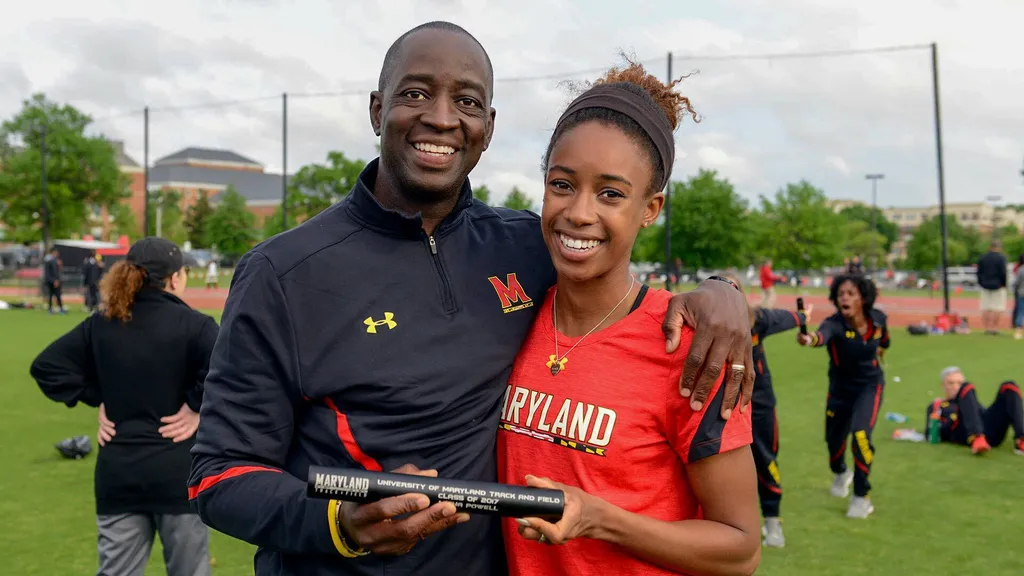- July 31, 2024
- By Karen Shih ’09
Paris has been good to Team USA. Five days into the Summer Olympics, Simone Biles has vaulted women’s gymnastics back to the top of the podium, social media breakout star Ilona Maher has led women’s rugby to its first medal, and American swimmers have nabbed more than a dozen pieces of hardware.
Now, it’s time to trade goggles and swim caps for singlets and sneakers as the track and field athletes get ready to step up to the starting block.
“Coming in behind some of these sports, you have no choice but to step up,” says longtime University of Maryland track and field Head Coach Andrew Valmon. “They’ve set the tone.”

He would know. The two-time Olympic gold medalist (1988 and 1992) once stood atop the podium with legends like Michael Johnson as part of the world record-breaking 4x400 relay team. And in 1993, he and the team smashed the record again at the world championships—a time that remains untouched today.
After his running career wrapped, Valmon transitioned into coaching, joining the Terps in 2003. He stayed involved with the national team and was named head coach of the 2012 track and field team in London, where U.S. athletes brought home a remarkable 28 medals, including 11 gold.
Valmon shares how his Olympic experiences were so different, the toughest part of competing and why he thinks many records could go down at this year’s Paris Games.
You had just graduated from college when you first competed in the Olympics in 1988 in Seoul, South Korea. What was that like?
There was a lot going on in that time, with the U.S. versus the Soviets. In 1980, the U.S. had boycotted, in 1984, the Eastern countries didn’t show up, and in 1988, some countries still didn’t come.
I was just happy to be in another country, to be parading in for the Opening Ceremony with people holding signs, running around. That year, we didn’t leave the Olympic Village, but we got to meet a lot of other athletes. You get to trade pins, uniforms—you might not come back with a lot of your gear because you’ve traded it!
For me, ’88 was a learning experience. I was part of the preliminary rounds for the 4x400 so I earned a gold medal. But going into the next Games, it was my mission to be in the final round.
What was it like to return to the Olympics in 1992?
We had the best of the best: The Dream Team with Larry Bird, Magic Johnson and Michael Jordan. Swimmers like Janet Evans and Matt Biondi, breaking records left and right. Everyone came together for Team USA. You felt that in 1992.
We had tied the world record for the 4x400 in 1988. So for 1992, we didn’t go in hoping we’d win—we went in figuring what we needed to do to win. It’s a mindset.
In the finals, I led the relay. You’re coming out of the blocks, a big camera in your face. When the red light’s on, the whole world is watching. There’s no time for, ‘Hi, Mom!’ You have to be dialed in, 100%. I was on the team with world record-holders Michael Johnson and Butch Reynolds. If you want extra pressure—there’s the pressure. I needed to run 44 seconds around the track, give us a lead and give the other guys room to run clear, without traffic.
I still have those shoes I wore for the medals. They’re really special.
What’s the most fun part of being at the Olympics?
You meet so many people in all sports. Charles Barkley even hung out in the village!
Seeing the different sports kept me calm, rather than sitting in my room thinking about when I was going to compete. The most unique one for me was fencing, because I had two friends who made the team. But I also went to the big three—basketball, gymnastics and swimming—and also saw a little taekwondo and judo. Seeing the athleticism and how people translate their craft, you have a newfound respect. There’s not one sport that’s above the other.
What’s the toughest part of being at the Games?
You might see athletes every four years, but it’s a daily process for them. That moment might last 9.8 seconds. There’s no do-overs. And in America, we really cherish medals. Nobody is talking about who got fourth place. So for the thousands of people who compete and don’t get one, that’s a big downside.
For track athletes, we compete from the middle to the end. Others compete first, then enjoy the Games. You have to stay dialed in until your number is called. There’s a chance for the 2028 Games that track will get moved to the front, but we’ll see.
What are you looking forward to at the Paris Games?
You root a little stronger for people you know, and we have four track and field Terps going this year. Assistant Coach Rudy Winkler is throwing the hammer in his third Olympics; triple jumper Thea LaFond has been jumping out of her mind recently and going to be in medal contention for Dominica; Chioma Onyekwere is a discus thrower competing for Nigeria; and my associate head coach, Danielle Siebert, is the women’s head manager for the track and field team.
There will be a massive amount of records broken this year. There’s so much talent, with a good veteran group and good college athletes. Who knows—maybe the 4x400 will go too! We’ve held the record since 1993. But if it happens, I’ll be the first to text all four men. I’ll keep it simple: “Congrats! Records are meant to be broken.”
